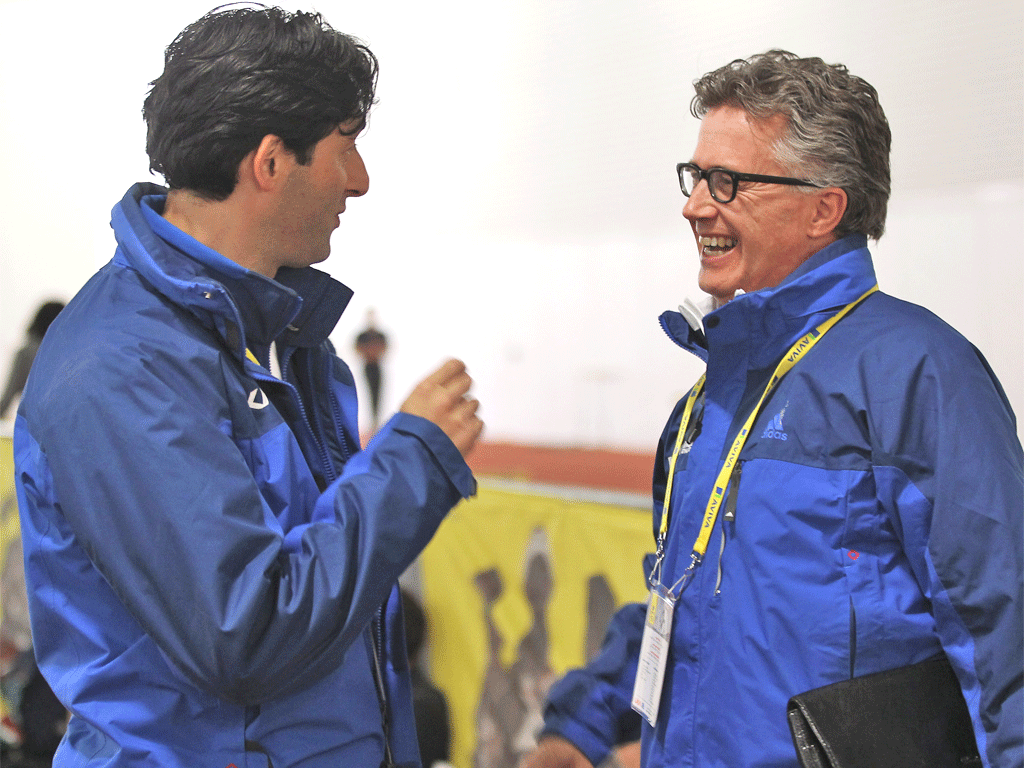Roger Black: Funny coach Fuzz will have given Grabarz a boost – he did for me too
He took the mickey because I was wearing my school uniform. No one else was. And because I was called Roger

It was great to see Robbie Grabarz win a bronze medal in the high jump. I was so pleased for Robbie and for his coach, Fuzz Ahmed. Fuzz is the reason that I took up athletics. He is the person who forced me – in my year off before going to university – to go to Southampton Athletics Club and train with him and Kriss Akabusi. He's the one who dragged me across there.
He was the one who spotted my talent. He said: "You are far better than you can imagine." Without Fuzz, I wouldn't have achieved what I did.
We met because we both competed for the Hampshire schools' team – Fuzz as a high jumper. I never did any club athletics when I was a kid. I just ran twice a year – at the Hampshire championships and at the English schools' championships.
Fuzz was the guy who befriended me on the coach going to the English schools' championships in Liverpool. He took the mickey out of me because I was wearing my school uniform. No one else was. And because I was called Roger.
He's a bit of a character – one of the five key people in my athletics career.
He's a fantastic coach and in many ways the ideal coach, because he wasn't a high performer himself as an athlete. He got to the Commonwealth Games but that was it.
The best coaches are usually the ones who have all the knowledge, all the attitude, but didn't quite get blessed with the talent.
Fuzz used to be an actor and a coach but he's a full-time coach now and he has turned Robbie around.
Fuzz has worked closely with myself and Steve Backley in our business and that's why we supported Robbie.
Fuzz said to me: "I've got this talented guy. He just needs a bit of guidance."
Fuzz is a force of nature within the British team. He's a young, dynamic coach, and that's what we need in our sport.
He's done a great job with Robbie. They'll be pleased with a bronze, but they'll know it was a missed opportunity. Robbie wants to be one of the great high jumpers of all time and what we want to help Robbie do, and what Fuzz wants him to do, is have sustainable performance.
We want him to be winning medals next year at the World Championships. We want him to win medals every time he jumps. As long as Robbie stays healthy, I'm very confident that he will do great things in the next four years.
I'm sure that Holly Bleasdale and Lawrence Okoye will do well in the years ahead, too. Like Robbie, they are both young (they're 20; Robbie is 24) and talented enough.
Holly and Lawrence have performed superbly this year. They will look back on 2012 as their breakthrough year.
They will both reflect on these Olympic Games with a degree of it being a missed opportunity but much more, hopefully, with a confidence and an experience to move forward and embark on two very successful careers.
The lucky thing for them is they have got a World Championships next year, so they haven't got to wait too long. In my day, the World Championships took place every four years, not every other year. You were waiting a long time.
So Holly and Lawrence can learn from the Olympic Games and come back out and take on the rest of the world this time next year in Moscow. Both of them made Olympic finals, which is a great achievement.
I wasn't surprised that neither of them were fighting for medals because it's tough. But they both will learn from that experience, make changes and, hopefully, look back on 2012 as a very positive year.
But they must learn. You don't want to be an athlete who does well in qualification, then doesn't deliver when it matters in the final. Ultimately, athletes are judged on what they do in finals.
Those two are young enough and they've got time on their side. But they don't want to make a habit of reaching the final and then underperforming.
80,000 people screaming is no distraction
My thoughts on the noise that the capacity crowds in the Olympic Stadium are making are very straightforward. Any athlete who is distracted by 80,000 people screaming, cheering for them, and willing them on, clearly isn't in the right place and probably isn't in the right business.
That should be an advantage, not a disadvantage. That's what you want. That's what a performer needs. There is no doubt that if, with 100m to go, you've got 80,000 people screaming you on, there's something in you that reacts to that.
I think it also helps the other athletes as well. I experienced that in Atlanta in 1996 when the home crowd were all cheering for Michael Johnson. Walking into that stadium the electricity was huge, because Michael going for his first gold medal was huge.
When the gun went the roar was immense. My brain didn't go, "Ooh, they're cheering for Michael". My brain just tuned in on the roar. They happened to be cheering for somebody else but I found it inspirational for me as well – I took the silver behind him. That cheering wasn't against me.
That kind of atmosphere definitely should be an advantage. If someone considers it a disadvantage, then I think they have to question their temperament and maybe work on it.
Roger Black is an ambassador for Scottish Widows, the official pensions and investments provider for the London 2012 Olympics
Join our commenting forum
Join thought-provoking conversations, follow other Independent readers and see their replies
Comments
Bookmark popover
Removed from bookmarks